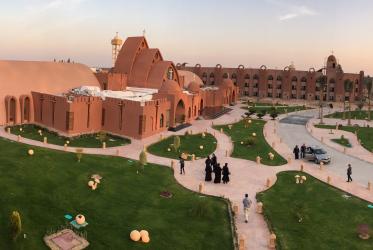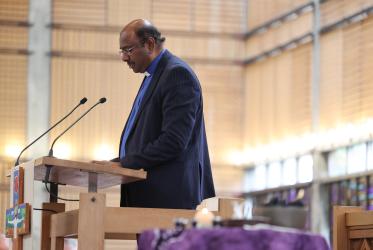Dry Bones: The Unification of Presbyterian Churches in Southern Africa
Presentation by Prof. Maake J. Masango
Introduction
In South Africa “Called to be the One Church” is not just an ecclesiological imperative; it is integrally a call to political, economic and social justice. As Archbishop Desmond Tutu, our most famous South African member of the Faith and Order Plenary Commission once said, “Apartheid is too strong for the divided churches.”
Christianity begins in South Africa as a divided community. The colonial missionaries exported to our land all the deep divisions of European Christianity, the kinds of division that Faith and Order has so long sought to overcome. But we experienced new kinds of division in the mid-nineteenth century, when in some churches whites would no longer receive Holy Communion with their black sisters and brothers. The sin of racism led to a new kind of Christian disunity, one that caused divisions within churches, not just between them, particularly amongst the Dutch Reformed family of churches. . The roots of political apartheid in the 20th century were deeply imbedded in the ecclesial apartheid of the nineteenth. The apartheid laws in turn accentuated the divisions in the churches.
The ecumenical movement, with its Call to be the One Church, touched South Africa as in other parts of the world. There was urgency in our churches, and yet there was also a indigenous South African foundation from which to respond to the ecumenical call.
The roots of ecumenism—God’s “call to be the One Church”—in the churches in southern Africa historically can be traced to the education and training of clergy, in particular the self-trained black clergy. These men were a significant force in the growth of the church in Africa. The integration of the self-trained black clergy into recognized mainstream Protestant congregations occurred through apprenticeship and training provided by theologians educated in graduate. Despite the rejection of African religious customs by the missionaries, many of these informally trained early black clergy banded together. They had their own knowledge-base from which to draw and share with their colleagues. As a result, cooperative learning structures within the churches produced a diverse African leadership.
In South Africa, this same trend continued in many of the mission schools, which became important centres of ethnic interaction. Institutions such as Federal Theological Seminary of Southern Africa (Fedsem, 1963-1975), the University of Fort Hare and the Lovedale Mission Institute used traditional African forms of education as an entry point for evangelical and pastoral formation, irrespective of ethnic origins. This resulted in a black clergy that transcended ethnic boundaries. In other words, cross-cultural study and living has fostered a spirit of cooperative work among clergy from different ethnic groups. This tradition of solidarity, regardless of ethnicity, continued through the colonial period and well into the life of independent African nations. This meant that clergy were exposed to different theological, doctrinal, and denominational orientations. This multilateral foundation can be regarded as one of the original wellsprings of South African ecumenism. The growth of these institutions was important and opened a window of Christian unity because students trained together and developed a trusting community. Schools such as Fedsem became a blessing because we lived and trained together. Little did we know that the seminary was training ecumenical leaders. It made us determine to fight both apartheid and denominationalism because they were weakening the churches voice in fighting apartheid. We were determined to fight denominationalism which allowed the structures of apartheid to divide us further. It was not always easy. Tension was experienced between black and white clergy, but interracial tensions also abounded. Those of us who were new to ordained ministry were frustrated by this attitude of separateness. Our mission was to train and work together.
That the leadership of our churches had a formation that was basically ecumenical was crucial to effective cooperation of all members of our churches in the struggle against apartheid. The indigenous multilateral cooperation amongst the African leaders made participation in other multilateral contexts easy for us, such as the World Council of Churches and the South African Council of Churches.
The role of the anti-apartheid churches, the place of ecumenism, the place of the WCC in the overthrowing of apartheid is well-enough known, and need not be rehearsed here.
The years since the fall of apartheid in 1994 have been a time of truth and reconciliation not only for South Africa as a nation, but also for its churches, which have taken up the call to be one church again. The aims of Faith and Order to “proclaim the oneness of the church of Jesus Christ and to call the churches to the goal of visible unity in one faith and one eucharistic fellowship” (By-laws of Faith and Order, 3.1) is lived out in particular way in the divided churches of South Africa today. Since the divisions requiring immediate healing are not those of the classic Faith and Order agenda, but the division of racism from the apartheid regime between and within families of churches, the ecumenical methodology is different. This quest for unity, however, does bear upon the functions of Faith and Order as expressed in our By-laws, namely “to study such questions of faith, order and worship as bear on this aim and to examine such social, cultural, political, racial and other factors as affect the unity of the church” (By-laws of Faith and Order, 3.2.a).
The Call to be One Church in the South African context is not only a deep part of the healing of the wounds from the past, but opens for us the path to the future. Given the history of Christianity in Africa and this growing tenet on what it means to be a modern Christian, the contemporary issue of denominational unification in Africa, especially in the Presbyterian Church in southern Africa, became unavoidable.
Modern Christianity, coupled with the idea of what it means to be a new South African—one who embraces a multiracial and multiethnic society has inspired many denominations to unite with churches that had previously seceded from the original church.
Faced with the pressures of globalisation and abject poverty—all common legacies of colonialism—not to mention more recent developments such as the HIV Aids pandemic, recent xenophobic violence, migration from other parts of Africa, the growing economic recession, and the like, the churches must unite in order to fight these challenges, no less than they did against apartheid. More generally put, no one can exist alone and certainly not during a tumulus time like this one. However, with the growing incorporation and acceptance of western concepts, like individualism that render ideas of community irrelevant, Africans have not relied on their own traditional systems to guide them.
Traditional ideas of community have only recently been elevated in our fight against poverty. Many African churches and communities have banded together, using the concept of “communalism” to fight poverty. In the midst of these problems, we have discovered the importance and necessity of a united church under God’s domain. Granting primacy to God, rather than to denominational differences, has reminded us that we are sisters and brothers in Christ. Our want and desire to fight issues such as apartheid, colonialism, poverty and disease has united us. In other words, regardless of racial, ethnic, national, gender, or denominational identity, or even whether a person is ordained minister or a layperson, all are created in the image and likeliness of God. Therefore Christ is Lord and Saviour of all.



